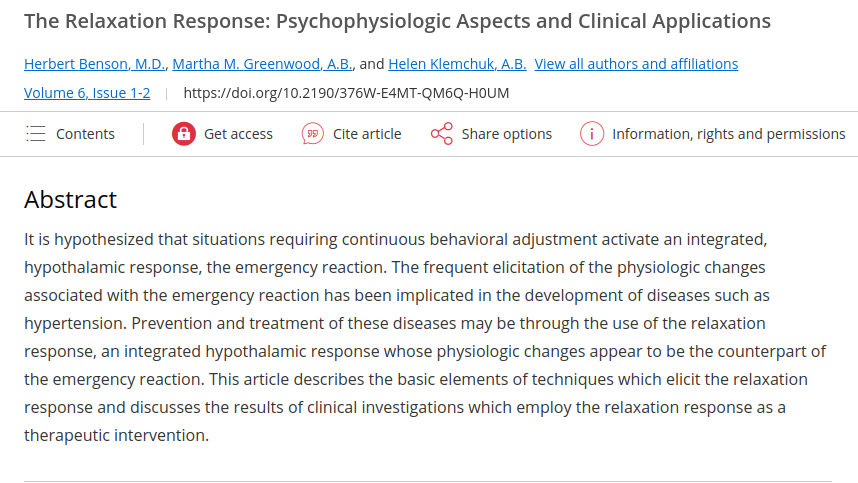Publication
The International Journal of Psychiatry in Medicine
6(1-2)
Abstract
It is hypothesized that situations requiring continuous behavioral adjustment activate an integrated, hypothalamic response, the emergency reaction. The frequent elicitation of the physiologic changes associated with the emergency reaction has been implicated in the development of diseases such as hypertension. Prevention and treatment of these diseases may be through the use of the relaxation response, an integrated hypothalamic response whose physiologic changes appear to be the counterpart of the emergency reaction. This article describes the basic elements of techniques which elicit the relaxation response and discusses the results of clinical investigations which employ the relaxation response as a therapeutic intervention.
Web and Email Links
Related Listings
Journal
Behavior Modification
Sleep latency changes following behavioral interventions for sleep-onset insomnia are only moderate because the majority of insomniacs do not achieve good sleeper status at posttreatment. This study evaluated the efficacy of a multifactor behavioral intervention consisting of stimulus control and relaxation-response training (n = 10) compared to stimulus control alone (n = 10) for sleep-onset insomnia. Only the multifactor subjects' mean posttest sleep latency fell within the good sle […]
Journal
International Journal of Cardiology
We report extremely prominent heart rate oscillations associated with slow breathing during specific traditional forms of Chinese Chi and Kundalini Yoga meditation techniques in healthy young adults. We applied both spectral analysis and a novel analytic technique based on the Hilbert transform to quantify these heart rate dynamics. The amplitude of these oscillations during meditation was significantly greater than in the pre-meditation control state and also in three non-meditation […]
Journal
Behavior Research and Therapy
The theoretical basis of systematic desensitization is reciprocal inhibition in which an alternative, competitive response to anxiety is conditioned to arousal-producing, phobic stimuli. Abbreviated training in progressive relaxation is believed to serve as a competitive response to anxiety by decreasing autonomic nervous system activity. However, physiologic studies of progressive relaxation have not substantiated that its practice is associated with such decreased autonomic activity […]

